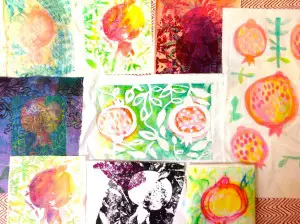I admire creative people. (While I do have “bursts” of creativity, I’m definitely more of a left-brained, logical type of person.) That is why I am happy to share these creative Valentine’s Day activities from educator and artist Susan Marcus. Susan and Dr. Cynthia Herbert are the co-authors of The Missing Alphabet: A Parents’ Guide to Developing Creative Thinking in Kids. Enjoy!
Got a tactile-learner? A kid who loves to dance? Or maybe your child really loves color? While every child has a constellation of Sensory Alphabet strengths (shape, color, movement and sound are just a few), your child probably has one or two that really stand out — that you notice in his or her artwork or in elements of his or her collections and activities. Valentine’s Day crafts provide ways for parents to nurture these strengths and help kids say I love you in fun creative ways. Below are craft ideas designed for each element of the Sensory Alphabet.
1. SHAPE: Is your child’s art always full of shapes? Cut out cookies! Make the process easier and faster by using dough from the grocery store refrigerator case. Find imaginative cookie cutters and combine shapes and words to say I love you in new ways.
2. SOUND: Let sound-oriented kids make a Valentine’s wind chime with metal, glass and wooden craft store finds. Throw in everyday household items like bowls and plates to create loving symphony.
3. COLOR: Make “stained glass” cookies with color-loving kids, using bread stick dough. Shape it to make the “leading” on a cookie sheet topped with foil. Use crushed colored sugar candies in the spaces, cook at 350 degrees and let the candies melt. Let cool before peeling off the foil. Experiment with the colors and explore what else can represent love besides red.
4. MOVEMENT: Have your kids spell out the letters of “I Love You” with their bodies, and then take pictures. These can be used to create a sweet card or frame.
5. LIGHT: Appoint the light-loving child as the official photographer for holiday events. A lesson in digital app photo editing (PhotoPad is free for the iPad) or in designing digital slideshows or print-on-demand books puts this creative eye into action.
6. TEXTURE: Make a Valentine’s card that focuses on touch rather than sight. Use bows, ribbons, homemade tassels and other textured embellishments. Feathers and sponge-and-paint prints are fun to cover things with.
7. SPACE: For little builders, create a giant heart using recycled boxes wrapped in plain paper or Popsicle sticks. Decorate it with stickers, markers, doilies and colored paper. When it’s done create a set of keys, and have your child give them to family and loved ones.
8. RHYTHM: With your rhythm kid, fill small glass jars (such as baby food jars or small jelly jars) with a tablespoon of different shake-able items such as beans, rice, red-and-green beads, and metal washers. Decorate the lids with foil tied around the tops and stickers for patterns. Shake along to Valentine’s songs.
9. LINE: A linear thinker loves stories. Put him or her to work making handmade Valentine’s books using photos that tell a story about the great love stories in your family. Start with folded paper with a construction paper cover, hole-punched and tied with string or stitched down the center on the sewing machine for the binding.
Matching a creative thinking strength to the right set of materials and a fun challenge can make it more fun — and help your child build from his or her strengths.
